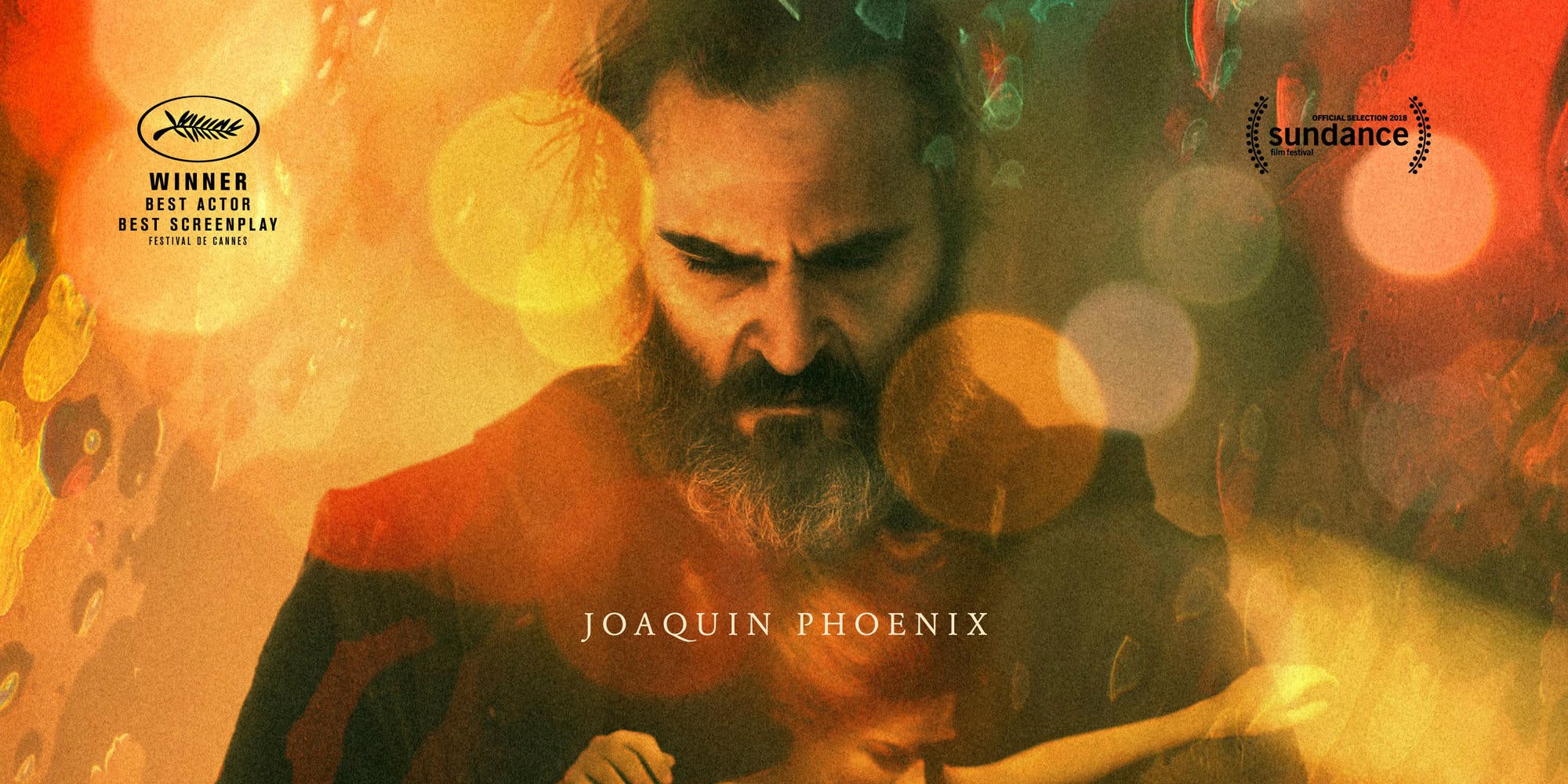I’ll give you a hint: the key is in the title.
Major Spoilers ahead.
In this reviewer’s opinion, You Were Never Really Here is undoubtedly the masterpiece of 2018 so far, so much so that it’s hard to imagine any film surpassing it. Crafted with a sense of immaculate style that assaults your every sense, it tells the story of Joe, a veteran suffering severe PTSD that stretches all the way back to a scarring and abusive childhood, as he is tasked with saving an underage girl from the sex trade. But when things go wrong, he uncovers a conspiracy that, as some plot descriptions have said, could lead either to his death or his awakening.
For a simple review of the film, I refer to my earlier review. What I want to do here is dissect the film, to some degree, in order to aid others in seeing the deeper meanings that unfold as the plot of the film moves along.
Lynne Ramsay employs stunning visual storytelling that brings to mind a mosaic art piece, tossing scattered images and sounds and evoking just as scattered emotions which fit together into a whole if you pay close enough attention, telling the story of Joe’s awakening, his emotional journey, beneath the surface movements of the plot.
Joe’s PTSD causes him to experience vivid and visceral flashbacks. We see brief images of his childhood under the rule of a father prone to using a hammer on his wife while young Joe tries so intensely to hide he nearly suffocated himself. We see disturbing things Joe witnessed as a soldier, such as gifting a refugee child with a candy bar, only to see that girl shot for the candy bar by another child. We see Joe as an FBI agent discovering a truckload of bodies, which in the book is described as being a moment that truly broke something in his mind.
These flashbacks in themselves tell a story. But there is even more to it than that.
 One of the early lines in the novel by Jonathan Ames, it describes Joe’s obsession with death. Or, more so, his obsession with dying, how he can’t get it out of his mind that he wants to die. It describes as he prepares to kill himself by consuming a large number of sleeping pills and duct-taping a bag around his head, and there is one sentence which I think is the key to understanding his character, both in the book and in the film:
One of the early lines in the novel by Jonathan Ames, it describes Joe’s obsession with death. Or, more so, his obsession with dying, how he can’t get it out of his mind that he wants to die. It describes as he prepares to kill himself by consuming a large number of sleeping pills and duct-taping a bag around his head, and there is one sentence which I think is the key to understanding his character, both in the book and in the film:
“He felt himself diminishing, a shadow around the edges of his mind, and he heard a voice say, It’s all right, you can go, you were never really here.”
He then removes the bag and pumps his own stomach, and decides that when it’s time, he will drown himself in the sea so as to not even leave his body behind to be cleaned up.
And that’s what I mean when I say the key to understanding the film on a deeper level is in its title. It captures the feeling that haunts Joe down to his very core: that he may as well have never have been there. His presence, his existence, doesn’t really matter and makes no difference. And the film shows this to us, hints at it, in unique ways.
There is a scene where he is drinking at a water fountain. Cut to a young girl who appears to be watching him from a seat. Cut back to the water fountain and Joe isn’t there even though the water is still going; after a moment, it turns off apparently by itself.
There is a scene of him waiting at the train station, walking across the screen, and the train begins to pass, and just before he reaches the edge of the screen he seems to disappear. It’s subtle enough to think maybe it was a trick of the passing train but noticeable enough to be jarring.
There’s another scene of him at the train station as he leans his head out over the tracks, perhaps imagining keeping his head there when the train passes, and we see a shot of him from below, from between the rails. He brings his head back and cut again to the same shot from between the rails, aimed at where he is standing, but he isn’t there.
Or at the little market after telling one of his informants that he can’t do business with him any longer because his kid saw him at a personal location, which compromises his safety if anyone were ever looking for him. The kid sees Joe come into the store, but as Joe is leaving, the kid looks up but Joe is already gone.
The film plays with this as a visual cue, a kind of subtle hinting of how Joe views his own existence, and it’s easy to miss for the deeper meanings because the film is so brilliantly in-your-face with how it shows us everything else from his scattered and traumatized mind. That is until Joe is truly ready to die.
In the novel—and I think it is shown in a complicated and beautiful way in the film—it is described that Joe’s only moments of joy in his life are those with his aging mother. He takes care of her, he deals with her aging, and she is a delight to him, and their scenes provide some of the only moments of slower tenderness in the film.
And then she is killed.
 In the film’s most sublime sequence, he buries her in a lake. He puts her in a bag and fills the bag with stones, and dresses himself in a nice suit, puts stones in his own pockets, and walks into the water. I have to add, there were tears in my eyes. It is one of the most beautifully haunting sequences in a film I’ve ever had the privilege of experiencing. And as he lets her body go beneath the water’s darkness, he too lets himself go, drifting down, at peace, as his mind counts down what’s left. But then he opens his eyes and sees an image of the girl he has been trying to save but who was taken again. And she is drifting away into the darkness with him, disappearing, and without words the film makes us understand that she is dying with him. He is her last hope at life.
In the film’s most sublime sequence, he buries her in a lake. He puts her in a bag and fills the bag with stones, and dresses himself in a nice suit, puts stones in his own pockets, and walks into the water. I have to add, there were tears in my eyes. It is one of the most beautifully haunting sequences in a film I’ve ever had the privilege of experiencing. And as he lets her body go beneath the water’s darkness, he too lets himself go, drifting down, at peace, as his mind counts down what’s left. But then he opens his eyes and sees an image of the girl he has been trying to save but who was taken again. And she is drifting away into the darkness with him, disappearing, and without words the film makes us understand that she is dying with him. He is her last hope at life.
Joe has a purpose, a reason to live. He removes the stones from his pockets and swims back to the surface, and we see an image of the girl beginning to swim up as well.
And after the climactic scene of Joe rescuing her, the final scene is of Joe and the girl sitting in a restaurant, unsure of what to do or where to go next. The girl gets up and appears to leave, and the film forgoes its previously subtle hints at how Joe has felt his whole life—as if he were never really here—and he shoots himself in the head. And no one notices. People in the restaurant go about their conversations, a waitress drops his check off. It’s as if he never mattered. “You Were Never Really Here.”
But he is awakened from this imagining by the girl’s soft hand. She tells him they should go, it’s a beautiful day, and he agrees.
After all of that, he matters to someone, he has left his mark on the world and on someone. It would matter to her if he were gone. And it is enough.
In this way, You Were Never Really Here is about so much more than it seems, at first. It’s the story of a broken man who thinks it would make no difference, would mean nothing if he were gone if he were to disappear. At the same time, it is a beautiful and brutal story wrapped in craft and attitude and style. It’s my favorite film of the year, and one of my favorite films of all time.


